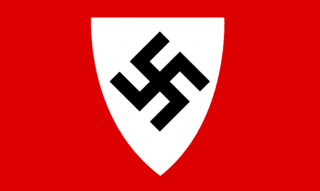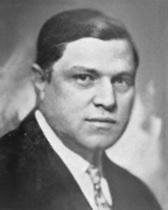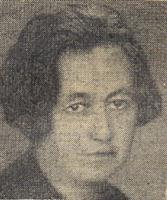
The Sudeten German Party was created by Konrad Henlein under the name Sudetendeutsche Heimatfront on 1 October 1933, some months after the First Czechoslovak Republic had outlawed the German National Socialist Workers' Party. In April 1935, the party was renamed Sudetendeutsche Partei following a mandatory demand of the Czechoslovak government. The name was officially changed to Sudeten German and Carpathian German Party in November 1935.

Parliamentary elections were held in Czechoslovakia on 18 and 25 April 1920. Members of the Chamber of Deputies were elected on 18 April and members of the Senate on 25 April. The elections had initially been planned for mid- or late 1919, but had been postponed.

Parliamentary elections were held in Czechoslovakia on 27 October 1929. The Republican Party of Farmers and Peasants, emerged as the largest party, winning 46 seats in the Chamber of Deputies and 24 seats in the Senate. Voter turnout was 90.2% in the Chamber election and 78.8% for the Senate. The rightward shift of the 1925 elections was reversed, with moderate centre-left groups increasing their vote shares whilst the Communist Party suffered a set-back.
The Jewish Party was a political party of the First Czechoslovak Republic. It was founded in 1919 by the Jewish National Council in Prague. It was the strongest Jewish political party in the interwar Czechoslovakia although many Jews were rather active in non-Jewish parties, be they Czech, German or Hungarian. The party adopted a Zionist political program and succeeded in influencing the Czechoslovak government to acknowledge Jews as an official national minority in the constitution of 1920.
The German Electoral Coalition was a political alliance in Czechoslovakia representing Sudeten Germans.

The Česká Lípa 5th electoral district was a parliamentary constituency in Czechoslovakia. It was one of two parliamentary constituencies with an overwhelming ethnic German majority amongst the voters. The Česká Lípa 5th electoral district elected 13 members of the Chamber of Deputies. In February 1921, the Czechoslovak authorities estimated that the electoral district had a total population of 564,449.

The Užhorod electoral district was a parliamentary constituency in Czechoslovakia for elections to the Chamber of Deputies and the Senate. The constituency covered all of Subcarpathian Ruthenia. The electoral district elected nine deputies in all elections held in the constituency during the First Czechoslovak Republic. The numbers of electors per each parliamentary seat was the highest in the Užhorod compared to all other electoral districts.

Parliamentary elections in the First Czechoslovak Republic were held in 1920, 1925, 1929 and 1935. The Czechoslovak National Assembly consisted of two chambers, the Chamber of Deputies and the Senate, both elected through universal suffrage. During the First Republic, many political parties struggled for political influence and only once did a single party muster a quarter of the national vote. Parties were generally set up along ethnic lines.

The Těšín electoral district was a parliamentary constituency in the First Czechoslovak Republic. It was set up ahead of the April 1920 parliamentary election in an area that both Czechoslovakia and Poland claimed as theirs. No vote was held there in 1920 and the constituency was abolished before the 1925 parliamentary election.

The Nové Zámky 16th electoral district was a parliamentary constituency in the First Czechoslovak Republic for elections to the Chamber of Deputies. The seat of the District Electoral Commission was in the town of Nové Zámky. The constituency elected 11 members of the Chamber of Deputies.
The German People's Group in Czecho-Slovakia was a German minority political party in the Second Czechoslovak Republic from 30 October 1938 to March 1939.

The Carpathian German Party was a political party in Czechoslovakia, active amongst the Carpathian German minority of Slovakia and Subcarpathian Rus'. It began as a bourgeois centrist party, but after teaming up with the Sudeten German Party in 1933 it developed in a National Socialist orientation.

Franz Karmasin was an ethnic German politician in Czechoslovakia, who helped found the Carpathian German Party. During World War II he was state secretary of German affairs in the Slovak Republic, and rose to the rank of SS-Sturmbannführer.

The German Party was a Nazi political party active amongst the German minority in Slovakia from 1938 to 1945.
Sudetendeutscher Landbund was a Sudeten German political party in interwar Czechoslovakia. The party was founded in 1928, following a split in the Farmers' League. The founding party congress was held in Brno on 25 March 1928. The founders of SdLB had constituted the völkisch wing of the Farmers' League. SdLB was a German nationalist farmers party, opposed to Czechoslovak statehood. Georg Hanreich and Josef Mayer served as chairmen of the party.
George Waschkies was an ethnic German politician in Lithuania. Waschkies was a farmer from Ußlöknen, East Prussia, who represented the Memel Agricultural Party in the Lithuanian parliament for a short stint in 1926–27.

The Košice 20th electoral district was a parliamentary constituency in the First Czechoslovak Republic for elections to the Chamber of Deputies. The seat of the District Electoral Commission was in the town of Košice. The constituency elected 7 members of the Chamber of Deputies.
Karl Kreibich was an ethnic German politician in the First Czechoslovak Republic.

Rudolf Böhm was an ethnic German politician and businessman in the First Czechoslovak Republic. Böhm was born in Košice on 6 August 1884. From the early 1920s, he was part of the Provincial Christian-Socialist Party leadership in Bratislava. He stood as candidate for the Senate in the 1925 Czechoslovak parliamentary election. He was elected to the Senate in the 1929 Czechoslovak parliamentary election. He died on 19 January 1933.

Franziska Blatny was a Czechoslovakian politician. In 1920 she was elected to the Chamber of Deputies, becoming one of the first group of female parliamentarians in the country.












